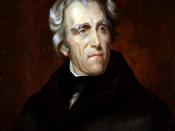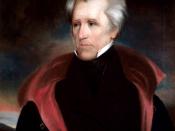Main Entry: de*moc*ra*cy
Pronunciation: di-'mä-kr&-sE
Function: noun
Inflected Form(s): plural -cies
Etymology: Middle French democratie, from Late Latin democratia, from Greek dEmokratia, from dEmos + -kratia -cracy
Date: 1576
1 a : government by the people; especially : rule of the majority b : a government in which the supreme power is vested in the people and exercised by them directly or indirectly through a system of representation usually involving periodically held free elections
2 : a political unit that has a democratic government
3 capitalized : the principles and policies of the Democratic party in the U.S.
4 : the common people especially when constituting the source of political authority
5 : the absence of hereditary or arbitrary class distinctions or privileges
In the 1830s and 1840s, the definition of the word "democracy" had America riding it's every syllable. Antebellum America had found a "common man" to call their president, Andrew Jackson.
In 1828, Jackson would win in a campaign that would stand as a paradigm of elections for years to come. To follow the tide of change in politics, Jacksonian democracy was established. An age of renovation led to progression in the growth of America; however, Jackson would fail to make the right executive decisions. The excessive concentration on the common man lead to the ignorance of the true minorities. Even with Jackson instituting a more equal formation of the government, he still portrayed something he wasn't. There was a national fervor for democracy, and Andrew Jackson was smart enough to ride the band wagon. He put all his effort into creating an illusion of him actually leading the movement. Nevertheless, the Age of Jackson was not all it was glorified to be, and so reforms and changes incited by the people were inevitable.
The election of 1828...


